Unit 1 Art知识讲解 虚拟语气(I).doc
- 格式:doc
- 大小:82.50 KB
- 文档页数:5
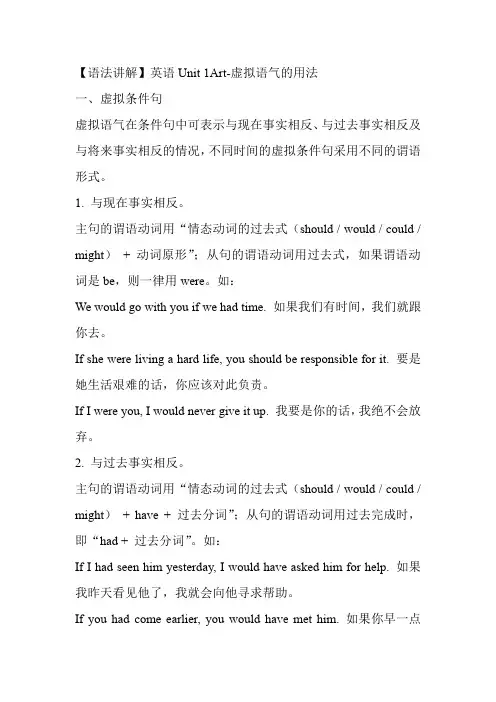
【语法讲解】英语Unit 1Art-虚拟语气的用法一、虚拟条件句虚拟语气在条件句中可表示与现在事实相反、与过去事实相反及与将来事实相反的情况,不同时间的虚拟条件句采用不同的谓语形式。
1. 与现在事实相反。
主句的谓语动词用“情态动词的过去式(should / would / could / might)+ 动词原形”;从句的谓语动词用过去式,如果谓语动词是be,则一律用were。
如:We would go with you if we had time. 如果我们有时间,我们就跟你去。
If she were living a hard life, you should be responsible for it. 要是她生活艰难的话,你应该对此负责。
If I were you, I would never give it up. 我要是你的话,我绝不会放弃。
2. 与过去事实相反。
主句的谓语动词用“情态动词的过去式(should / would / could / might)+ have + 过去分词”;从句的谓语动词用过去完成时,即“had + 过去分词”。
如:If I had seen him yesterday, I would have asked him for help. 如果我昨天看见他了,我就会向他寻求帮助。
If you had come earlier, you would have met him. 如果你早一点来,你已经见到他了。
3. 与将来事实相反。
主句的谓语动词用“情态动词的过去式(should / would / could / might)+ 动词原形”;从句的谓语动词可酌情用:1)一般过去时;2) should + 动词原形(表示可能性较大);3) were to + 动词原形(表示可能性较小)。
如:If it rained (were to rain / should rain) tomorrow, they would not go out. 如果明天下雨,他们就不会外出。

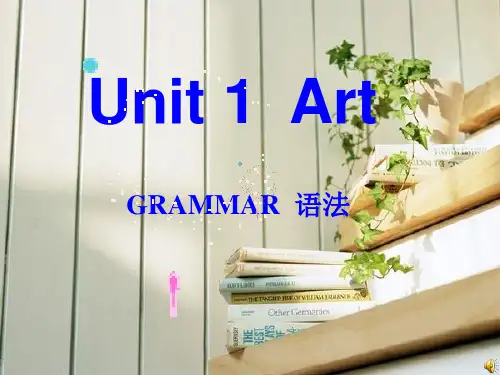
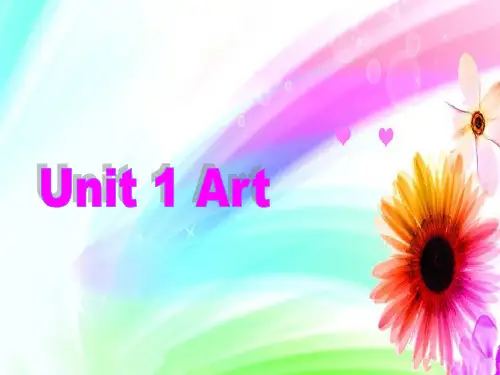
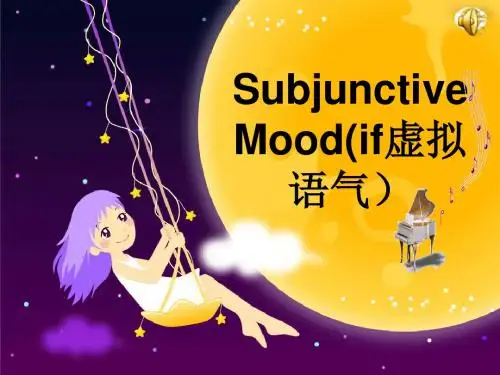
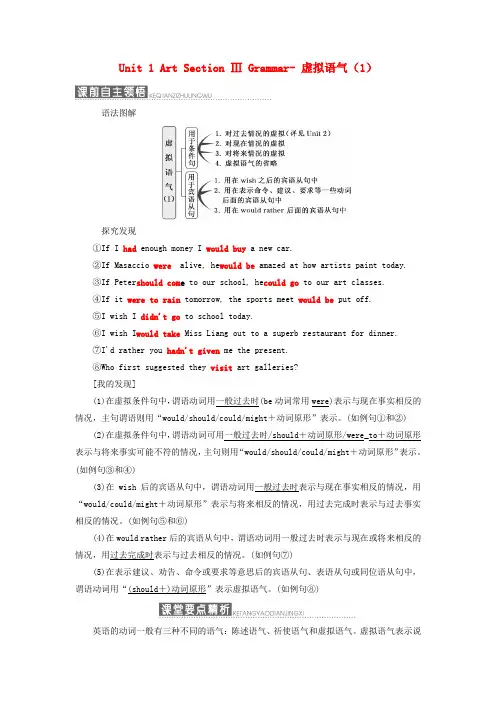
Unit 1 Art Section Ⅲ Grammar- 虚拟语气(1)①If I had enough money I would buy a new car.②If Masaccio were alive, he would be amazed at how artists paint today.③If Peter should com e to our school, he could go to our art classes.④If it were to rain tomorrow, the sports meet would be put off.⑤I wish I didn't go to school today.⑥I wish I would take Miss Liang out to a superb restaurant for dinner.⑦I'd rather you hadn't given me the present.⑧Who first suggested they visit art galleries?[我的发现](1)在虚拟条件句中,谓语动词用一般过去时(be动词常用were)表示与现在事实相反的情况,主句谓语则用“would/should/could/might+动词原形”表示。
(如例句①和②)(2)在虚拟条件句中,谓语动词可用一般过去时/should+动词原形/were_to+动词原形表示与将来事实可能不符的情况,主句则用“would/should/could/might+动词原形”表示。
(如例句③和④)(3)在wish后的宾语从句中,谓语动词用一般过去时表示与现在事实相反的情况,用“would/could/might+动词原形”表示与将来相反的情况,用过去完成时表示与过去事实相反的情况。
(如例句⑤和⑥)(4)在would rather后的宾语从句中,谓语动词用一般过去时表示与现在或将来相反的情况,用过去完成时表示与过去相反的情况。
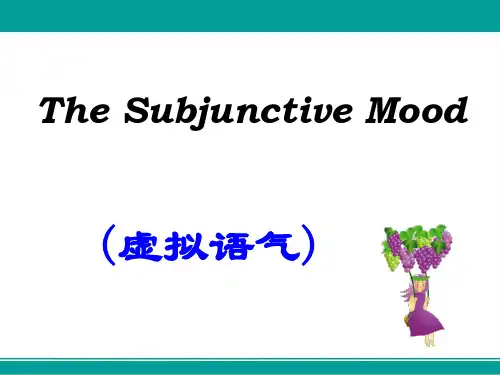
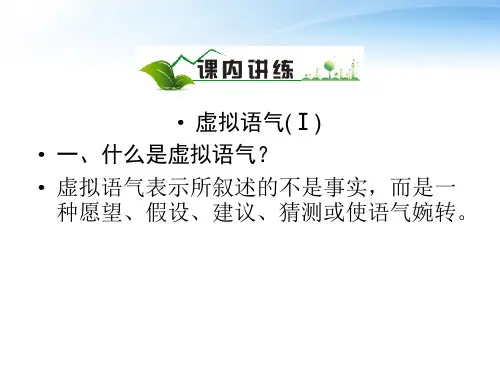

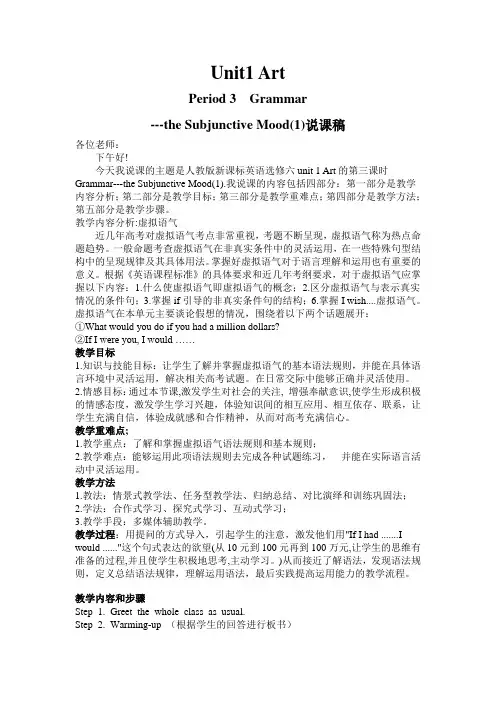
Unit1 ArtPeriod 3 Grammar---the Subjunctive Mood(1)说课稿各位老师:下午好!今天我说课的主题是人教版新课标英语选修六unit 1 Art的第三课时Grammar---the Subjunctive Mood(1).我说课的内容包括四部分:第一部分是教学内容分析;第二部分是教学目标;第三部分是教学重难点;第四部分是教学方法;第五部分是教学步骤。
教学内容分析:虚拟语气近几年高考对虚拟语气考点非常重视,考题不断呈现,虚拟语气称为热点命题趋势。
一般命题考查虚拟语气在非真实条件中的灵活运用,在一些特殊句型结构中的呈现规律及其具体用法。
掌握好虚拟语气对于语言理解和运用也有重要的意义。
根据《英语课程标准》的具体要求和近几年考纲要求,对于虚拟语气应掌握以下内容:1.什么使虚拟语气即虚拟语气的概念;2.区分虚拟语气与表示真实情况的条件句;3.掌握if引导的非真实条件句的结构;6.掌握I wish....虚拟语气。
虚拟语气在本单元主要谈论假想的情况,围绕着以下两个话题展开:①What would you do if you had a million dollars?②If I were you, I would ……教学目标1.知识与技能目标:让学生了解并掌握虚拟语气的基本语法规则,并能在具体语言环境中灵活运用,解决相关高考试题。
在日常交际中能够正确并灵活使用。
2.情感目标:通过本节课,激发学生对社会的关注, 增强奉献意识,使学生形成积极的情感态度,激发学生学习兴趣,体验知识间的相互应用、相互依存、联系,让学生充满自信,体验成就感和合作精神,从而对高考充满信心。
教学重难点;1.教学重点:了解和掌握虚拟语气语法规则和基本规则;2.教学难点:能够运用此项语法规则去完成各种试题练习,并能在实际语言活动中灵活运用。
教学方法1.教法:情景式教学法、任务型教学法、归纳总结、对比演绎和训练巩固法;2.学法:合作式学习、探究式学习、互动式学习;3.教学手段:多媒体辅助教学。
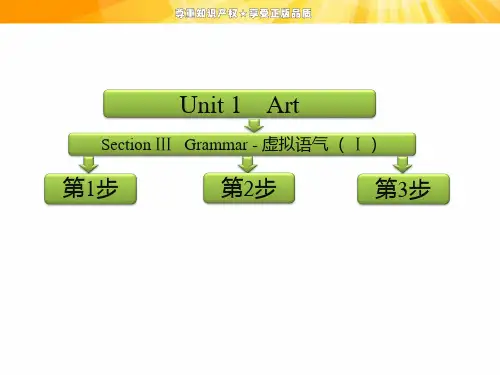
课时作业(二)Unit 1Section ⅡGrammar——虚拟语气(一)Ⅰ。
阅读理解AI didn’t know how to say no, and was afraid to tell people what I wanted。
Instead, I got myself tangled (纠结的) in a web of obligations, anxiety, and white lies。
The worst thing was that I didn’t eve n realize what I was doing. I thought I knew how to say “no”- but couldn't remember the last time I had。
Like a lot of people,I just wanted to be accepted,appreciated,loved—and that the only way to get those things was to put everyone else’s needs befor e my own。
I never seemed to have time for things I really wanted to do. I’d like to learn Spanish, write more fiction,and travel。
These aren’t huge,unrealistic goals。
And yet,my peoplepleasing ways dramatically cut into my free time to pursue these desires。
But recently,I decided I’d had enough。
As an experiment,I began standing up for myself, even at the risk of alienating (使疏远) myself from everyone and having my entire life come crashing down around me。
虚拟语气(1)编稿:牛新阁审稿:王春霞概念引入动词的语气表示说话人的态度和看法,可分为陈述语气、祈使语气和虚拟语气。
1. 陈述语气用来陈述事实或可能发生的事,有肯定、否定、疑问和感叹等形式。
Aileen showed great concern about you. 艾琳很为你担心。
(肯定)My legs were so weak that I could hardly stand. 我的腿软得简直不能站立。
(否定)Would you care to come and stay with me over the weekend? (疑问)你愿意来和我过周末吗?2. 祈使语气用来提出请求、发出命令、警告、威胁、叮嘱、祝福、建议等。
Enjoy yourselves with your trip. 一路愉快。
(叮嘱)Don’t let this type of things happen again. 别让这种事再次发生。
(警告)3. 虚拟语气是说话人为表达一种假设, 或一种主观愿望, 即认为动词所表示的动作或状态并非真实或仅是主观设想时所用的动词形式。
我们先看这些含虚拟语气的句子:1. If you were an artist, what kind of pictures would you paint?2. If you could have three of these paintings on the walls of your classroom, which wouldyou choose?3. If the rules of perspective had not been discovered, no one would have been able to paintsuch realistic pictures.4. Without the new paints and new technique, we would not be able to see the many greatmasterpieces for which this period is famous.5. Have you ever wished you could paint as well as a professional artist?本单元将重点学习if从句的虚拟语气和wish和“suggest”类后的宾语从句中的虚拟语气的用法。
用法讲解if引导的虚拟条件句1. 真实条件句与虚拟条件句:条件句分成两种,一种是真实条件句,一种是非真实条件句。
真实条件句用陈述语气,所做的假设,说话人认为是可以实现的,或者与事实相符的;而使用虚拟条件句时,说话人知道所做假设与事实不符,或者很可能无法实现的。
如:If I have enough money, I will go to the zoo with you.如果我有足够的钱,我会和你一起去动物园。
(暗含“我看看钱是否够,如果够我就去”)If I had enough money, I would go to the zoo with you.如果我有足够的钱,我会和你一起去动物园。
(暗含“我事实上没有足够的钱,没法和你去”)分词If I were a bird, I would fly into the sky. 如果我是只鸟,我要飞向天空。
(“我”不是鸟,也不能飞向天空,所以假设与现在事实相反,从句的be用were,主句用would+动词原形)If it were to rain tomorrow, the meeting would be put off. 如果明天下雨,会议就会延期。
(说话人认为明天不会下雨,要表示“与将来事实可能相反”,从句用were to+动词原形,从句用would+动词原形,因为动词短语put off与主语“会议”有被动关系,用be put off)If there were no gravity, we should not be able to walk.假如没有地心引力,我们就不能行走。
(事实:There is gravity. 与现在事实相反)I would go travelling, if I had lots of money.如果我有许多钱,我会去旅游。
(事实:I don’t have lots of money. 与现在事实相反)If he should see me, he would know me.假如他看见我, 就会认识我。
(事实:He won’t see me. 与将来事实相反)If it were Sunday tomorrow, I might go to see my grandmother. (与将来事实相反)如果明天是星期天,我就去看望我奶奶。
3. 注意:1. 在虚拟语气中,be的各人称形式都用were;在非正式文体中,第三人称单数有时也用was。
但是在If I were you中,不能用was。
2. 在主句中,should只用于第一人称。
3. 如果对正在进行的动作的虚拟,应换为相应的动词的进行时。
If I were not listening to the radio, I would be sleeping.如果我现在不是在听收音机,我会正在睡觉。
(事实是:现在正在听收音机,没在睡觉)4. 主句中would, could, might的意义:If you had another go, you would succeed. 如果你再试一次,你一定会成功。
(would表示必然的结果)If you had another go, you could succeed. 如果你再试一次,你就能成功。
(could表示“能够”)If you had another go, you might succeed. 如果你再试一次,你或许能成功。
(might表示可能的结果)4. 拓展——if onlyif only 意思是“要是......就好了”,后面常加虚拟语气:谓语动词用一般过去时表示目前的愿望,用过去完成时表示过去的愿望,用would或could接动词原形表示将来的愿望。
If only I knew his phone number. 我要是知道他的电话号码就好了。
(与现在事实相反)If only you had come to the get-together. 如果你参加了聚会就好了。
(与过去事实相反)If only she would listen to me carefully. 但愿她会仔细听我讲话。
(与将来事实可能相反)【高清课堂:虚拟语气(下)wish---suggest后的宾语从句】wish后的宾语从句中的虚拟语气wish和hopewish表示“愿望”,而hope表示“希望”。
wish后描述的是人们美好的愿望,很有可能是不能实现的,所以wish就要用虚拟语气,而其虚拟语气是通过宾语从句的谓语动词的变化实现的。
wish 现在时did(be动词用were)希望“同步”发生某事过去时had + done 希望“之前”发生某事将来时couldwould希望“之后”发生某事(1) I wish I were ten years younger. 我希望我能够年轻十岁。
I wish I knew how to drive a car. 真希望我会开车。
(2) I wish I had gone to the football match last night. 我希望昨晚我去看足球比赛了。
(注意:last night表明用had gone)(3) He wishes you would go and visit him. 他希望你会来看他。
I wish the boys could be quiet. 我希望男孩们能保持安静。
注意:从句谓语动词的变化不受wish的时态的影响,无论wish还是wished,我们只需判断从句谓语动作是和wish同步发生,还是在wish前,还是在wish后发生的,就可以了。
不要受前面这个词的变形影响。
试一试:1) I wish I ________a bird. (be)2) I wish/wished I ________ (not eat) so much watermelon.3) The party was terrible, I wish I ________ (never go) to it.4) I wish it ________ (rain) tomorrow.答案与解析:1) were。
现在的愿望,即与wish同步的愿望,用were。
不用was。
2) hadn’t eaten。
说话人吃西瓜吃得肚子都大了,所以一定希望以前没有吃这么多西瓜,用hadn’t eaten。
3)had never gone。
从前句“晚会太糟糕了”可知,已经去过晚会了,是希望以前没去参加,所以用had never gone。
注意never是副词,一般放在助动词后,一般动词前。
4) would rain。
希望明天下雨,用would rain。
“suggest”类的宾语从句的虚拟语气“suggest”类的宾语从句中谓语用(should)+动词原形。
我们没有学虚拟语气时,老师经常告诉我们suggest作“建议”讲时,从句谓语用“(should)+ 动词原形”。
现在我们知道还有一些词也有这种用法,这些词都表示主观的想法、看法、建议、命令、请求等等,因为是主观给别人的一些建议,所以你不能保证别人按你说的去做,因此属于虚拟的范围。
这些词包括:第一种记法:(disco 迪斯科舞, rap 说唱)D: demand (要求), desire (欲望)I: insist (坚持), idea (看法、注意)S: suggest (v.), suggestion (n.) 建议C: command (命令)+ doO: order (命令)R: require (要求), request (有礼貌的请求), recommend (推荐)A: advise (v.), advice (n.) 建议P: propose (v.), proposal (n.) 提议注意:demand, desire, command, order, request既是名词,也是动词。
另外一种记法:一个坚持:insist两个命令:order, command三个建议:advise, suggest, propose五个要求:demand, require, request, desire, ask(注意:少recommend)例如:He ordered that the students (should) wash the clothes every week by themselves.他命令学生们每周自己洗衣服。